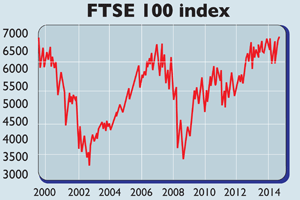British blue-chip stocks rebound
Why have UK blue chips only just limped back to their all-time high – and what comes next? Andrew Van Sickle reports.

Get the latest financial news, insights and expert analysis from our award-winning MoneyWeek team, to help you understand what really matters when it comes to your finances.
You are now subscribed
Your newsletter sign-up was successful
Want to add more newsletters?

Twice daily
MoneyWeek
Get the latest financial news, insights and expert analysis from our award-winning MoneyWeek team, to help you understand what really matters when it comes to your finances.

Four times a week
Look After My Bills
Sign up to our free money-saving newsletter, filled with the latest news and expert advice to help you find the best tips and deals for managing your bills. Start saving today!
Better late than never. Early this week, the FTSE 100 index finally closed above the 6,930 mark it first hit in December 1999. Germany's Dax and America's S&P 500 indices have been in record territory for a few years now. So why have UK blue chips only just limped back to their all-time high and what comes next?
Firstly, despite the apparently weak performance, some investors who rushed into British stocks in late 1999 will still have done well. The FTSE 100, like most indices, simply measures price levels, not dividend payouts. The FTSE 100 Total Return index, which takes income and capital gains into account, is 66% ahead of its December 1999 level a reminder of how important it is to reinvest your dividends.
But as far as the index itself goes, sliding commodity prices have been a major drag in recent years. Oil and mining companies comprise 25% of the index, compared to less than 10% in most developed equity markets. With China's government still trying to deflate its credit bubble, demand for raw materials will remain tepid. So while the worst of the downswing may be over, a rapid rebound is not on the cards.
MoneyWeek
Subscribe to MoneyWeek today and get your first six magazine issues absolutely FREE

Sign up to Money Morning
Don't miss the latest investment and personal finances news, market analysis, plus money-saving tips with our free twice-daily newsletter
Don't miss the latest investment and personal finances news, market analysis, plus money-saving tips with our free twice-daily newsletter

That said, in recent months sterling has weakened again, notably against the dollar, which bodes well for dividends. Companies reporting in dollars pay 40% of UK dividends, as Capita, Britain's top share registrar, points out. This should offset the impact of lower earnings at the oil majors.
But while one headwind has faded, another could strengthen as the general election in May draws nearer. Although a hung parliament is supposedly priced in, "the reality of what such a situation might mean is arguably not", says James Quinn in The Daily Telegraph.
A Labour-led coalition on the one hand, and an "in/out" EU referendum under a Tory-led grouping on the other, are both potentially damaging for listed firms.
As for valuations, the FTSE 100's price/earnings ratio is 16, a far cry from almost 30 in late 1999. But it's still not wildly compelling it's a smidge above the long-term average of 15. The upshot is that the FTSE 100 looks set to keep lagging.
Get the latest financial news, insights and expert analysis from our award-winning MoneyWeek team, to help you understand what really matters when it comes to your finances.

-
 Should you buy an active ETF?
Should you buy an active ETF?ETFs are often mischaracterised as passive products, but they can be a convenient way to add active management to your portfolio
-
 Power up your pension before 5 April – easy ways to save before the tax year end
Power up your pension before 5 April – easy ways to save before the tax year endWith the end of the tax year looming, pension savers currently have a window to review and maximise what’s going into their retirement funds – we look at how